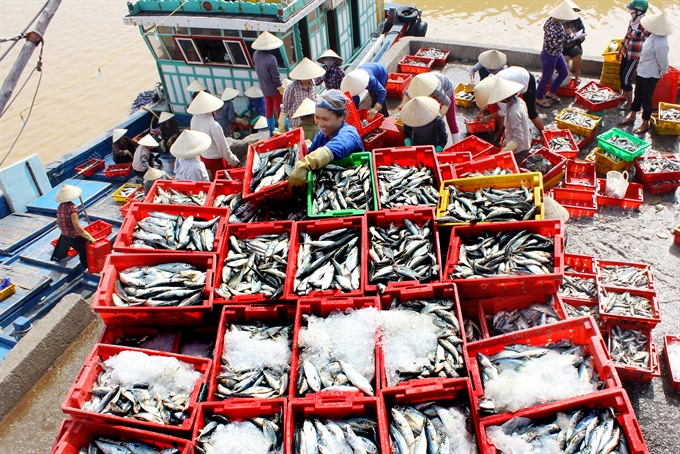|
APEC looks at food security amidst climate change
CẦN THƠ – The Policy
Partnership on Food Security (PPFS) meeting was held in Cần Thơ yesterday
during the APEC Food Security Week to shape actions to ensure food security in
the context of climate change and urbanisation.

Fish caught at Sầm Sơn Beach, central Thanh Hóa Province. - VNA/VNS
Photo Quang Quyết
PPFS members updated the two-day meeting on outcomes of completed and ongoing activities for 2017, and discussed and approved the action plans to implement the APEC Framework for Multi-Year APEC Programme on Food Security and Climate Change and APEC Strategic Framework for Rural-Urban Development to Strengthen Food Security and Quality Growth.
Deputy Minister of Agriculture and Rural
Development Lê Quốc Doanh said agriculture
depends much on climate.
“The
earth’s temperature rise has been challenging agriculture with disease
spread, unstable productivity, serious droughts, freshwater scarcity, loss of
bio-diversity, and others.”
Urbanisation,
despite its advantages like job creation, infrastructure development and
raising incomes, also brings difficulties like insufficient lands for food
production.
“Việt
Nam has taken serious measures and made fundamental changes. In large parts
of the farm sector, the monitoring of agronomic practices for sustainability
standards, natural resource management, waste management, and energy
efficiency have been mainstreamed, balancing economic growth and
environmental sustainability, as specifically stated in the Agricultural
Restructuring Plan.”
Given
the unprecedented impacts of climate change, and also impacts of
urbanization, a stronger focus is needed on enhancing food security and
sustainable, more resilient agriculture and quality growth through better use
of advanced technologies and enhancement of regional and global food value
chains, he said.
“Food
security requires APEC economies to take collective action.”
APEC
economies need to strengthen co-operation to improve governance and efficient
use of natural resources while securing long-term food supply, and APEC
should find ways to facilitate the transfer and application of technologies
to increase agricultural productivity, quality, sustainability and
resilience, he said.
Incentives
to fully engage farmers and the private sector should be shared among APEC
members, he added.
“APEC
as a whole should work together to create a policy environment to facilitate
the participation of farmers, small households and the private sector and
strengthen the public - private partnership model to promote food security,
he said.
“In
a regionalised world of profound challenges, APEC needs to make greater
efforts and act as a driver of global growth. It is time for us to turn the
commitment we have into actions clarified in the Action Plans.”
Pruthipong Poonthrigobol, PPFS director, said:
“The Action Plans and other strategic frameworks and work programmes on the
PPFS Roadmap towards Food Security 2020 laid the foundation for our work of
attaining the APEC Food System by 2020.
“We would urge member economies to continue
the efforts."
Ocean
and fisheries group meeting
On the same day the APEC Oceans and
Fisheries Working Group (OFWG) also began its two-day ninth annual meeting.
It aims to complete the fourth
assessment of its work in 2017, review some of its ongoing projects, discuss
new projects that have recently been included in its agenda, and go over the
goals of the next annual meeting, according to Patrick E. Moran, lead
shepherd of APEC-OFWG.
Moran, who will chair the second
official joint meeting of OFWG along with other APEC working groups including
the PPFS on Wednesday, stressed the importance of the joint meeting, saying
that one of the large projects and action plan adopted by PPFS were closely
connected with the work of the OFWG.
He said the OFWG would focus mostly
on areas where it could collaborate more effectively with PPFS.
"It’s very important now that
we have access to PPFS’s process that we can engage and bring our work to
them and demonstrate how fisheries and oceans are an important part of the
food security dialogue."
According to a report by OFWG, APEC
members account for over 80 percent of global aquaculture production and more
than 65 percent of capture fisheries.
The consumption of fishery products
in the APEC region is 65 percent higher than the world average. As APEC
economies represent nine of the top 10 fish producers in the world, APEC’s
focus on oceans and fisheries issues is natural.
Speaking on the sidelines of the
meeting, Moran told Việt Nam News that
food security is a very important part of APEC economies, yet in the past the
food security dialogues in APEC were all about rice, wheat, corn, etc.
"It took us a long time to
explain how fisheries is an important part of that dialogue as well,
particularly in the region."
He said that since APEC Food
Security Week would be held every year, OFWG would try to figure out how it
could co-ordinate with PPFS so that everyone’s work goes in the right
direction.
"We are going to work hard to
make sure we can bring added value to the food security discussion.”
Trần Đình Luân, deputy general
director of the Ministry of Agriculture and Rural Development’s Directorate
of Fisheries, said since OFWG’s meeting in February in Nha Trang APEC
economies have already joined hands to take significant strides towards the
implementation of the working group’s strategic plan.
The outcomes of its meeting in Cần
Thơ would serve as important inputs for high-level APEC policy dialogues on
enhancing food security and sustainable agriculture in response to climate
change and for APEC’s co-operation direction, he added. -VNS
|
Thứ Ba, 22 tháng 8, 2017
Đăng ký:
Đăng Nhận xét (Atom)
Không có nhận xét nào:
Đăng nhận xét